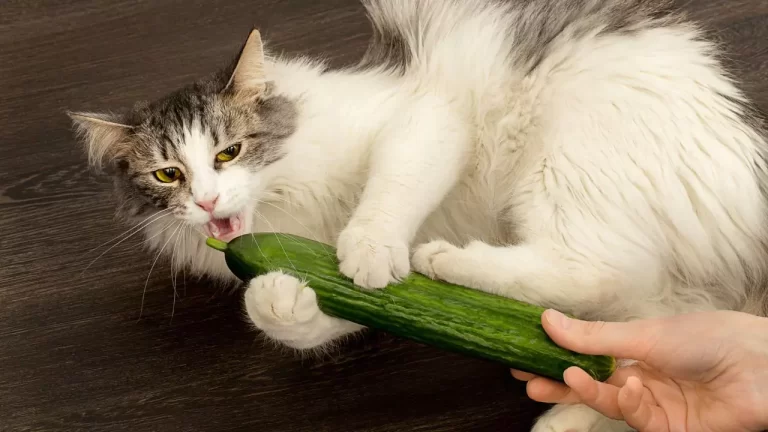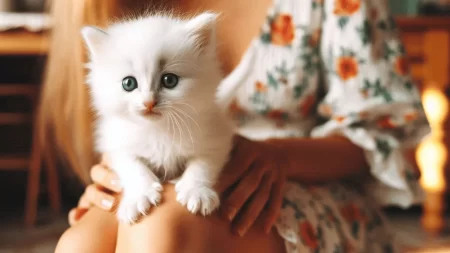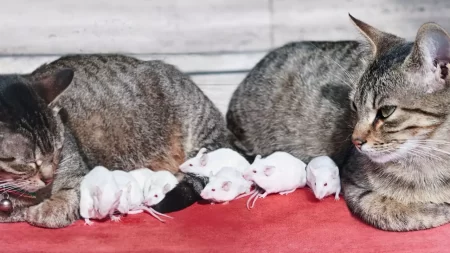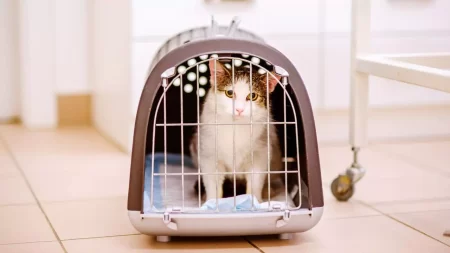Cats are often afraid of cucumbers because they are startled by the sudden appearance of an unfamiliar object behind them.
Some theories suggest that cats may also associate cucumbers with snakes, which are natural predators of felines, or that they may have difficulty seeing the green vegetable in their peripheral vision.
Scaring your cat with a cucumber can cause anxiety and stress, which can have negative effects on your cat’s health and behavior.
There are also other foods and objects that can scare cats, such as bananas, water, and reflections. To keep your cat calm around cucumbers, you should avoid using them as a prank, gradually introduce new objects to your cat, and consult with a veterinarian for anxiety management techniques.
Theories Behind Cats’ Fear of Cucumbers
There is no definitive answer to why cats are afraid of cucumbers, but there are some possible explanations based on cat psychology and biology.
- Cats don’t like surprises: Cats are creatures of habit and prefer a stable and predictable environment. They are also very sensitive to sounds and movements around them. When a cucumber is placed behind them without their knowledge, they may perceive it as a threat and react with fear or aggression. This is similar to how some cats react to loud noises or sudden movements.
- Cats are scared of snakes: Some experts believe that cats may instinctively fear cucumbers because they resemble snakes, which are natural enemies of felines. Cats have evolved to avoid snakes and other venomous animals, as they can pose a serious danger to their survival. Cucumbers have a similar shape, color, and texture to some snakes, which may trigger a primal fear response in cats.
- Cats can’t see the cucumber: Another theory is that cats may have trouble seeing the cucumber in their peripheral vision, due to the way their eyes are structured. Cats have excellent vision in low-light conditions, but they have a narrower field of view than humans. They also have less color vision and more difficulty focusing on close objects. This means that they may not notice the cucumber until they turn around and see it up close, which can cause them to panic.
- Cats don’t like unfamiliar objects: Cats are also very curious and cautious animals, who like to investigate new things in their environment. However, they may also be wary of unfamiliar objects that they don’t recognize or understand. Cucumbers are not something that cats usually encounter in their daily lives, so they may be confused or suspicious of them. They may also associate them with unpleasant experiences, such as being sprayed with water or having their food taken away.
The Dangers of Scaring Your Cat
While it may seem amusing to watch your cat’s reaction to a cucumber, it is not a harmless prank. Scaring your cat with a cucumber can cause anxiety and stress, which can have negative effects on your cat’s health and behavior.
- Can cause anxiety: Anxiety is a state of fear or nervousness that occurs when an animal perceives a potential threat or danger. Anxiety can affect your cat’s physical and mental well-being, as it can cause physiological changes such as increased heart rate, blood pressure, breathing rate, and cortisol levels. Anxiety can also impair your cat’s immune system, making them more susceptible to infections and diseases.
- Signs of anxiety in cats: Anxiety can manifest in different ways in cats, depending on their personality and coping skills. Some common signs of anxiety in cats include:
- Hiding or avoiding people and other animals
- Aggression or defensive behavior
- Excessive grooming or scratching
- Changes in appetite or litter box habits
- Vocalization or meowing
- Destructive behavior or marking territory
- Depression or lethargy
Other Foods and Objects That Scare Cats
Cucumbers are not the only food or object that can scare cats. There are many other things that can trigger a fear response in felines, depending on their individual preferences and experiences. Some examples are:
- Bananas: Bananas are another food that some cats may find frightening, for similar reasons as cucumbers. Bananas have a yellow color and a curved shape that may resemble a snake or another predator. Bananas also have a strong smell that may be unpleasant or unfamiliar to cats.
- Water: Water is something that most cats dislike or fear, as they are not adapted to swim or get wet. Water can make their fur heavy and uncomfortable, and reduce their body temperature and insulation. Water can also interfere with their sense of smell and hearing, which are essential for their survival and communication. Some cats may also associate water with negative experiences, such as being bathed or sprayed.
- Reflections: Reflections are another source of confusion and fear for some cats, as they may not understand that they are seeing their own image or a mirror. Reflections can also create optical illusions or distortions that may seem threatening or unnatural to cats. Some cats may try to attack or chase their reflections, while others may run away or hide from them.
Tips for Keeping Cats Calm Around Cucumbers
If you want to keep your cat calm and happy around cucumbers, you should follow these tips:
- Avoid using cucumbers as a prank: The most important thing is to avoid scaring your cat with a cucumber, as it can cause unnecessary stress and anxiety. Scaring your cat with a cucumber is not funny or harmless, but cruel and irresponsible. It can damage your cat’s trust and relationship with you, and make them more fearful and insecure in general.
- Gradually introduce new objects: If you want to introduce a new object to your cat, such as a cucumber or another food, you should do it gradually and gently. You should let your cat see, smell, and touch the object at their own pace, and reward them with praise or treats for being curious and brave. You should also avoid placing the object behind them or in their blind spot, as it can startle them and make them feel threatened.
- Consult with a veterinarian for anxiety management techniques: If your cat shows signs of anxiety or stress, you should consult with a veterinarian for advice and treatment. Your veterinarian may prescribe medication or supplements to help your cat relax and cope with their fears. They may also recommend behavioral therapy or environmental enrichment to reduce your cat’s anxiety and improve their quality of life.







